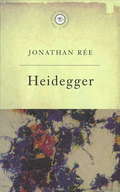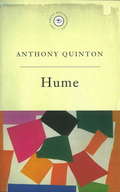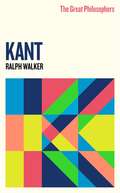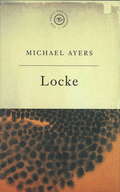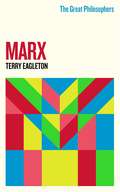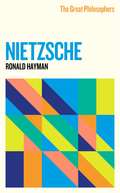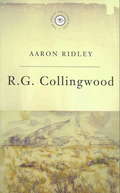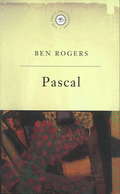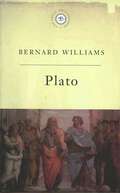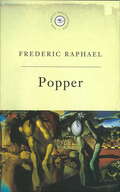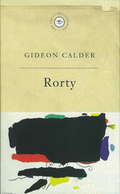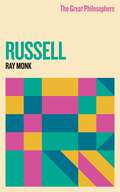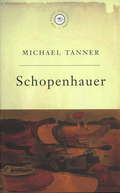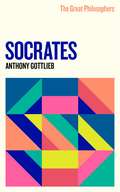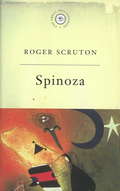- Table View
- List View
The Great Philosophers: Hegel
by Raymond PlantPart of the GREAT PHILOSOPHERS series.G.W.F. Hegel 1770-1831Without Hegel, modern thought is unthinkable. From Marx to Merleau-Pontyh, from Kierkegaard to Nietzsche, those whose ideas have made the modern age have all worked in his shadow.For Hegel's preoccupations have turned out to be our own. The isolation of the individual adrift in society, the yearning of the divided self for an integrated wholeness: these are anxieties his successors have shared. The rival claims of the personal and the public, the immediate instant and the wider historic narrative: these have remained pressing problems through two hundred years of change.Yet if his 'philosophy' seems as contemporary as ever, Hegel's 'religious' views have been dismissed as irrelevant anachronism. The distinction is false, however. In his theological explorations, suggests Raymond Plant in this illuminating new guide, Hegel tackled the issues of interest to us all.
The Great Philosophers: Hegel (GREAT PHILOSOPHERS)
by Raymond PlantPart of the GREAT PHILOSOPHERS series.G.W.F. Hegel 1770-1831Without Hegel, modern thought is unthinkable. From Marx to Merleau-Pontyh, from Kierkegaard to Nietzsche, those whose ideas have made the modern age have all worked in his shadow.For Hegel's preoccupations have turned out to be our own. The isolation of the individual adrift in society, the yearning of the divided self for an integrated wholeness: these are anxieties his successors have shared. The rival claims of the personal and the public, the immediate instant and the wider historic narrative: these have remained pressing problems through two hundred years of change.Yet if his 'philosophy' seems as contemporary as ever, Hegel's 'religious' views have been dismissed as irrelevant anachronism. The distinction is false, however. In his theological explorations, suggests Raymond Plant in this illuminating new guide, Hegel tackled the issues of interest to us all.
The Great Philosophers: Heidegger
by Johnathan ReeHeidegger 1889-1976 `We ourselves the entities to be analysed.? With those words, Martin Heidegger launched his assault on the `sham clarity? of traditional Western thought. We are neither immortal souls nor disembodied intellects, he argues, but finite historical existences. And we are bound to the world by threads of interpretation and misinterpretation more strange and tangled than we can ever hope to comprehend. In his masterpiece Being and Time (1927) Heidegger used his technique of `existential analysis? to undercut traditional dilemmas of objectivity and subjectivity, rationality and irrationality, absolutism and relativism. Truth itself, he argues, is essentially historical. The greatest adventures of twentieth-century thought can be seen as footnotes to Being and Time, and in this brilliantly lucid exposition Jonathan Rée spells out all its main arguments without blunting any of its disturbing paradoxes.
The Great Philosophers: Hume
by Anthony QuintonA short book combining extracts from the work of one of the world's greatest thinkers with commentary by one of Britain's most distinguished writers on philosophy.
The Great Philosophers: Hume (The\great Philosophers Ser. #10)
by Anthony QuintonA short book combining extracts from the work of one of the world's greatest thinkers with commentary by on of Britain's most distinguished writers on philosophy.
The Great Philosophers: Kant (Great Philosophers Ser.)
by Ralph WalkerImmanuel Kant 1724-1804 `Dry, obscure? prolix.? That was Kant?s own critique of his first Critique ? and exasperated students since have extended it to the rest of his work. Yet despite its sprawling form and forbidding content, Kant?s moral philosophy has continued to compel the attention of every serious thinker in the field. Today, indeed, it seems more important than ever. Never has the need for moral absolutes been more pressing than in this age of genocide and oppression, and yet as old certainties dissipate themselves in doubt and disillusion, not only religious faith but humanist confidence have found themselves supplanted by cynicism. If the appeal to a judging deity appears an evasion, even to believers, utilitarian head-counting seems no more than an exercise in ethical accountancy. This is where Kant comes in. Clear, concise ? and overwhelmingly convincing ? Ralph Walker?s lucid guide spells out the power and renewed relevance of his thinking: a genuinely objective, absolute basis for a modern moral law.
The Great Philosophers: Locke (GREAT PHILOSOPHERS)
by Michael AyresPart of the GREAT PHILOSOPHERS series.John Locke 1632-1704What Newton did for physics in the seventeenth century, Locke did for philosophy. The revolution wrought by these two giants established the intellectual underpinnings of the modern world.Yet out own age has called their contributions into question. While Newton's universe has come to seem unduly mechanistic, Locke has been out of favour for his wordy rhetoric, the apparent imprecision of his thought and the perceived irrelevance of his once-radical empiricism.This fascinating guide restores an underrated thinker to his rightful place at the very centre of modern philosophical enquiry. Basing his exposition upon a resourceful re-reading of An Essay concerning Human Understanding, Michael Ayers explains the historical significance of Locke's philosophical project, and its continuing capacity to challenge and compel.
The Great Philosophers: Locke (Great Philosophers Ser. #12)
by Michael AyresPart of the GREAT PHILOSOPHERS series.John Locke 1632-1704What Newton did for physics in the seventeenth century, Locke did for philosophy. The revolution wrought by these two giants established the intellectual underpinnings of the modern world.Yet out own age has called their contributions into question. While Newton's universe has come to seem unduly mechanistic, Locke has been out of favour for his wordy rhetoric, the apparent imprecision of his thought and the perceived irrelevance of his once-radical empiricism.This fascinating guide restores an underrated thinker to his rightful place at the very centre of modern philosophical enquiry. Basing his exposition upon a resourceful re-reading of An Essay concerning Human Understanding, Michael Ayers explains the historical significance of Locke's philosophical project, and its continuing capacity to challenge and compel.
The Great Philosophers: Marx (The\great Philosophers Ser. #13)
by Terry EagletonPart of the GREAT PHILOSOPHERS series. Terry Eagleton explains that freedom, for Marx, entailed release from commercial labour, "a kind of creative superabundance over what is materially essential". Eagleton outlines the relationship between production, labour and ownership which lie at the core of Marx's thinking. Marx's utopia was a place in which labour is increasingly automated, emancipating the wealth of sensuous individual development so that "savouring a peach [is an aspect] of our self-actualisation as much as building dams".
The Great Philosophers: Nietzsche
by Ronald Hayman'God is dead', announced Nietzsche - before going on to abolish himself.Envious contemporaries of Nietzsche ridiculed him as a mad man - and yet they came closer than they knew in characterising a philosopher in whose thought ambivalence approximated to disintegration of the self. While the nineteenth century's coherent, consistent systems of certainty came crashing down ingloriously at the very first touch of the twentieth, Nietzsche's discourses survived. He was more modern, it seemed, than the moderns. In this stimulating and provocative guide, Hayman reveals how Nietzsche's work is more contemporary and relevant than ever in a new postmodern age.
The Great Philosophers: Nietzsche (The\great Philosophers Ser. #No. 5)
by Ronald HaymanA short book combining extracts from the work of one of the world's greatest thinkers combined with commentary from one of Britain's most distinguished writers on philosophy.
The Great Philosophers: Parliament Under Pressure (GREAT PHILOSOPHERS)
by Aaron RidleyR. G. Collingwood 1889-1943Many philosophers have been interested in aesthetics, but Collingwood was passionate about art. His theories were never merely theoretical: aesthetics for him was a vivid, vibrant thing, to be experienced immediately in worked paint and in sculpted stone, in poetry and music.Art and life were no dichotomy for Collingwood - for how could you have one without the other? Works of art were created in and for the real world, to be enjoyed by real people, to enchant and enhance.Aaron Ridley's fascinating introduction opens up the work of this most rewarding of aesthetic thinkers, tracing his thought from its philosophic origins through to its practical consequence and ethical implications. The man who saw art as 'the community's medicine for the worst disease of mind' had a sense of its urgent importance which we ignore at our peril today.
The Great Philosophers: Parliament Under Pressure (Great Philosophers Ser. #4)
by Aaron RidleyR. G. Collingwood 1889-1943 Many philosophers have been interested in aesthetics, but Collingwood was passionate about art. His theories were never merely theoretical: aesthetics for him was a vivid, vibrant thing, to be experienced immediately in worked paint and in sculpted stone, in poetry and music. Art and life were no dichotomy for Collingwood ? for how could you have one without the other? Works of art were created in and for the real world, to be enjoyed by real people, to enchant and enhance. Aaron Ridley?s fascinating introduction opens up the work of this most rewarding of aesthetic thinkers, tracing his thought from its philosophic origins through to its practical consequence and ethical implications. The man who saw art as `the community?s medicine for the worst disease of mind? had a sense of its urgent importance which we ignore at our peril today.
The Great Philosophers: Pascal (Great Philosophers Ser. #15)
by Ben RogersPascal 1623-1662 The moralist who advocated dressing up, the ascetic who liked a flutter, the devout Christian who lauded vanity, Pascal is a funnier, more ironic philosopher than his reputation as an anguished existentialist would suggest. Yet however irreverent the terms of his ironic project, its underlying impetus is both serious and profound. In this superb new introduction to the thinker and his thought, Ben Rogers demonstrates the deep wisdom of Pascal?s defence of popular folly ? a defence which he used to highlight the higher delusions of the learned. Setting the Pensées in the context of Pascal?s life and philosophical career, Rogers reveals how their apparent frivolity underpins a fascinating, far-reaching and still challenging body of moral and political thought. His remarkable guide offers an eye-opening account of the work of a marvellous and much neglected thinker.
The Great Philosophers: Plato (GREAT PHILOSOPHERS)
by Professor Bernard WilliamsPlato c428 - c348BCWithout the work of Plato, western thought is, quite literally, unthinkable. No single influence has been greater, in every age and in every philosophic field. Even those thinkers who have rejected Plato's views have found themselves working to an agenda he set.Yet between the neo-platonist interpretations and the anti-platonist reactions, the stuff of 'Platonism' proper has often been obscured. The philosopher himself has not necessarily helped in the matter: at times disconcertingly difficult, at other disarmingly simple, Plato can be an elusive thinker, his meanings hard to pin down. His dialogues complex and often ironically constructed and do not simply expand his views, which in any case changed and developed over a long life.In this lucid and exciting new introductory guide, Bernard Williams takes his reader back to first principles, re-reading the key texts to reveal what the philosopher actually said. The result is a rediscovered Plato: often unexpected, always fascinating and rewarding.
The Great Philosophers: Plato (Great Philosophers Ser.)
by Bernard WilliamsPlato c428 ? c348BC Without the work of Plato, western thought is, quite literally, unthinkable. No single influence has been greater, in every age and in every philosophic field. Even those thinkers who have rejected Plato?s views have found themselves working to an agenda he set. Yet between the neo-platonist interpretations and the anti-platonist reactions, the stuff of `Platonism? proper has often been obscured. The philosopher himself has not necessarily helped in the matter: at times disconcertingly difficult, at other disarmingly simple, Plato can be an elusive thinker, his meanings hard to pin down. His dialogues complex and often ironically constructed and do not simply expand his views, which in any case changed and developed over a long life. In this lucid and exciting new introductory guide, Bernard Williams takes his reader back to first principles, re-reading the key texts to reveal what the philosopher actually said. The result is a rediscovered Plato: often unexpected, always fascinating and rewarding.
The Great Philosophers: Popper (GREAT PHILOSOPHERS)
by Frederic RaphaelKarl Popper 1902-1994The political history of the twentieth century has been full of savage 'certainties'. A similar idea of history warranted the callous savageries of both Marxism and Fascism. They shared a faith in what Karl Popper called 'Historicism': the belief that the future could be predicted and that man had to align himself with its bloody progress.Totalitarianism, Popper maintained, was based on ideas implicit in Western philosophy, from Plato to Hegel and Marx. It was his unique achievement to challenge the fundamental arguments in which Left and Right cloaked their authority.At a time when Communism and Fascism were devastatingly alluring to many intellectuals, Popper attacked their philosophical roots with passionate reasonableness and unflinching scepticism. As Frederic Raphael suggests in this elegant and intriguing introduction to his philosophy of science and history, Popper's epic modesty may have made him the most radical thinker of our times.
The Great Philosophers: Popper (Great Philosophers Ser. #17)
by Frederic RaphaelKarl Popper 1902-1994 The political history of the twentieth century has been full of savage `certainties?. A similar idea of history warranted the callous savageries of both Marxism and Fascism. They shared a faith in what Karl Popper called `Historicism?: the belief that the future could be predicted and that man had to align himself with its bloody progress. Totalitarianism, Popper maintained, was based on ideas implicit in Western philosophy, from Plato to Hegel and Marx. It was his unique achievement to challenge the fundamental arguments in which Left and Right cloaked their authority. At a time when Communism and Fascism were devastatingly alluring to many intellectuals, Popper attacked their philosophical roots with passionate reasonableness and unflinching scepticism. As Frederic Raphael suggests in this elegant and intriguing introduction to his philosophy of science and history, Popper?s epic modesty may have made him the most radical thinker of our times.
The Great Philosophers: Rorty (Great Philosophers Ser.)
by Gideon CalderPopular Great Philosopher's Series.An accessible overview of the work of one of our most influential living philosophers, as part of the popular Great Philosophers series. Richard Rorty is often cited as the most prominent philosophical defender of postmodernism. Best known for his unusually readable books and articles on philosophy - most notably Philosophy and the Mirror of Nature (1979) and Contingency, Irony, and Solidarity (1989) - Rorty has for some years now been a wide-ranging public intellectual, unwilling to be confined within the boundaries of academe. There is no real school of Rortianism. But Rorty-bashing is almost an industry in itself. He is a renegade to purists, a reactionary to radicals and a subversive to conservatives. And yet he presents his ideas as the culmination and extension of many of the most familiar and fashionable trends in contemporary thinking.
The Great Philosophers: Russell
by Ray MonkBertrand Russell 1872-1970Bertrand Russell discovered mathematics at the age of eleven. It was, he recalled, a transporting experience: 'as dazzling as first love.'From that moment on, he would pursue his passion with undying devotion and all but erotic fervour. Mathematics might succeed, he felt, where philosophy had failed, reducing thought to its purest form, and freeing knowledge from doubt and contradiction.And so, for a time, it seemed. Russell's mathematical investigations effortlessly resolved at a stroke some of philosophy's most intractable problems. Yet if mathematics could be a liberating mistress, she was an unreliable one...Opening up the work of one of our age's undisputed giants, Ray Monk's exhilaratingly clear, readable guide tells a compelling human tale too: a moving story of love and loss, of ecstatic triumph and deep disillusion.
The Great Philosophers: Russell (GREAT PHILOSOPHERS)
by Ray MonkBertrand Russell 1872-1970Bertrand Russell discovered mathematics at the age of eleven. It was, he recalled, a transporting experience: 'as dazzling as first love.'From that moment on, he would pursue his passion with undying devotion and all but erotic fervour. Mathematics might succeed, he felt, where philosophy had failed, reducing thought to its purest form, and freeing knowledge from doubt and contradiction.And so, for a time, it seemed. Russell's mathematical investigations effortlessly resolved at a stroke some of philosophy's most intractable problems. Yet if mathematics could be a liberating mistress, she was an unreliable one...Opening up the work of one of our age's undisputed giants, Ray Monk's exhilaratingly clear, readable guide tells a compelling human tale too: a moving story of love and loss, of ecstatic triumph and deep disillusion.
The Great Philosophers: Schopenhauer (Great Philosophers Ser. #19)
by Michael TannerSchopenhauer 1788 ? 1860 Western philosophy?s most profound and unrelenting pessimist, Schopenhauer hymned the miseries of human existence with a joylessness that was little short of lyrical. Yet he thrilled to the beauties of music and art. How did such deep bleakness and such sublime enthusiasm come to coincide in one man, one mind? Only by squaring these two sides of Schopenhauer can we truly hope to understand this most paradoxical ? even perverse of thinkers. Only through his thoughts on Beauty can we apprehend his attitude towards Truth. The failure of later philosophers down the generations to resolve these apparent contradictions has seen Schopenhauer?s thought unjustly marginalized and philosophy itself much poorer. Michael Tanner?s enthralling introduction teases out the difficulties and unpicks the paradoxes to reveal the exhilarating coherence beneath. It amounts to nothing less than a rediscovery of one of Western tradition?s greatest philosophers.
The Great Philosophers: Socrates (GREAT PHILOSOPHERS)
by Anthony Gottlieb'If you put me to death,' Socrates warned his Athenian judges, 'you will not easily find anyone to take my place.' So indeed it would prove, a single cup of hemlock robbing the western philosophical tradition of the man with best claims to be its founding father.Yet Socrates' influence was not so easily to be done away with. His words lovingly recorded by his devoted disciple Plato, his doctrines reached a posterity which has, through twenty-seven centuries now, taken him as its teacher.The marriage of idealism and scepticism in his though; his sense of education as self-discovery; his view of philosophy as preparation for life: these have been the stuff of western thought at its best. So completely did Socrates embody these values, he was prepared to die in their defence...
The Great Philosophers: Socrates (Great Philosophers Ser. #No. 6)
by Anthony GottliebSocrates 469 ? 399BC `If you put me to death,? Socrates warned his Athenian judges, `you will not easily find anyone to take my place.? So indeed it would prove, a single cup of hemlock robbing the western philosophical tradition of the man with best claims to be its founding father. Yet Socrates? influence was not so easily to be done away with. His words lovingly recorded by his devoted disciple Plato, his doctrines reached a posterity which has, through twenty-seven centuries now, taken him as its teacher. The marriage of idealism and scepticism in his though; his sense of education as self-discovery; his view of philosophy as preparation for life: these have been the stuff of western thought at its best. So completely did Socrates embody these values, he was prepared to die in their defence?
The Great Philosophers: Spinoza (GREAT PHILOSOPHERS)
by Roger ScrutonBorn to be misunderstood, Spinoza was a man whose theology was banned for Godlessness. The very virtuosity of his reasoning left logicians unsettled, while even to professional thinkers in our own time, Spinoza has seemed too clever by half. And yet, as Roger Scruton shows in this strikingly readable introduction to the man and his though, Spinoza's concerns were both simple and sublime. Few philosophers, indeed, have shown such a straightforward, sustained and honest interest in uncovering the most fundamental aspects of existence. Too important to be dismissed as a mere genius, Spinoza is rediscovered here in all his quiet and consoling simplicity.

